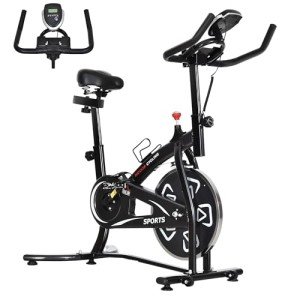Why Exercising Bike Is So Helpful In COVID-19?
The Benefits of Exercising with a Bike: A Comprehensive Guide
Cycling is typically seen simply as a method of transportation or a pastime. Nevertheless, it has developed into a popular kind of exercise and a health-conscious way of life option around the world. Stationary bicycles, spinning classes, and outdoor cycling offer different advantages that incorporate physical, mental, and environmental aspects. This post will explore the benefits of utilizing a bike as an exercise tool, useful pointers for newbies, and answers to regularly asked questions.
Physical Benefits of Cycling
Cardiovascular Health
Among the most considerable advantages of cycling is its positive influence on cardiovascular health. As a low-impact aerobic exercise, cycling raises the heart rate and boosts blood circulation, reinforcing the heart. A strong cardiovascular system minimizes the risk of heart disease, lowers high blood pressure, and assists handle cholesterol levels.
Weight Management
Cycling acts as a fantastic tool for weight management. Depending on the intensity and period of the workout, people can burn considerable calories through cycling. According to research studies, cycling can burn between 400 to 1000 calories per hour. This calorie burning can add to weight reduction when matched with a well balanced diet plan.
Muscle Strength and Endurance
Cycling engages numerous muscle groups, such as the quadriceps, hamstrings, glutes, and calves. This low-impact exercise helps tone muscles without positioning excessive stress on the joints. Additionally, Stationary Bikes Online increases overall endurance, allowing individuals to carry out everyday activities with higher ease.
Improved Joint Mobility
For individuals with joint issues or arthritis, cycling can use a pain-free way to stay active. The smooth, forward movement of cycling helps lube the joints, increasing flexibility while decreasing the threat of injury common in high-impact workouts.
Psychological Benefits of Cycling
Tension Reduction
Participating in physical activity like cycling can lead to the release of endorphins, typically referred to as “feel-good hormones.” It improves mood and reduces tension, stress and anxiety, and feelings of anxiety. Riding a bike, particularly outdoors, enables people to get in touch with nature, even more enhancing mental wellness.
Improved Cognitive Function
Studies have actually revealed that regular physical activity, including cycling, can enhance cognitive abilities such as memory, discovering, and problem-solving skills. The increase in blood flow to the brain throughout physical activity assists destroy toxic substances and raise mental clarity.
Social Connection
Cycling can likewise work as a social activity, where people can join clubs or trip with family and friends. These social interactions can combat sensations of loneliness and produce a sense of belonging, contributing positively to mental health.
Environmental Benefits
Switching from a cars and truck to a bicycle can substantially lower an individual's carbon footprint. Cycling is an eco-friendly mode of transport that assists decrease air contamination, lower fossil fuel consumption, and promote much healthier urban spaces.
Getting Going with Cycling
For novices, using up cycling may seem complicated. However, the following ideas can assist relieve worries and promote safe and satisfying cycling experiences:
Choose the Right Bike: Select a bike that fits your body size and cycling goals. Choices might consist of road bikes, mountain bicycle, hybrids, or stationary bikes. Think about taking a test ride.
Start Slowly: If brand-new to cycling, begin with brief rides and slowly increase the range and duration. This will assist develop fitness without overwhelming your body.
Strategy Your Routes: Identify safe cycling paths in your location. Parks, bike lanes, and less trafficked streets are perfect for beginners.
Wear Appropriate Gear: Always use a helmet for defense. Buying cycling shorts and comfortable clothing can improve the cycling experience.
Stay Hydrated: Hydration is essential, particularly throughout warmer months or longer rides. Keep a water bottle helpful.
Maintain Your Bike: Regular maintenance is key to making sure a safe and smooth ride. Check tire pressure, brakes, and the bike chain occasionally.
Types of Cycling Workouts
Cycling offers various styles and strengths to match different choices and fitness levels:
- Leisure Cycling: Casual rides around communities or parks, ideal for families.
- Commuter Cycling: Cycling to work or school, adding to transportation needs and promoting fitness.
- Spinning Classes: High-intensity indoor cycling exercises led by instructors, focusing on speed and endurance.
- Mountain Biking: Riding on rugged surfaces, interesting adventure enthusiasts searching for an obstacle.
- Road Cycling: Long-distance rides on paved surfaces, excellent for developing endurance.
Frequently asked questions About Cycling as an Exercise
**1. How frequently should I cycle to see health benefits?For optimal benefits, objective for at least 150 minutes of moderate-intensity cycling each week. This could be broken down into short trips throughout the week. 2. Is cycling ideal for all ages?Yes, cycling is ideal for a lot of age
groups, including children and older adults. It can be modified based on fitness level and ability. 3. Can I cycle inside if I do not have access to outside spaces?Absolutely! Stationary bicycles, stationary bicycle, or spinning classes offer a fantasticalternative for indoor cycling. 4. How can I prevent cycling injuries?To avoid injuries, use proper bike equipment, ensure your bike is well-kept, and be mindful of your posture while riding. Start with much shorter rangesand slowly increase strength. 5. What kinds of exercises can improve cycling performance?Incorporating strength training, versatility workouts, and cross-training activities like swimming can enhance cycling efficiency and general fitness.****
Cycling is a versatile and gratifying kind of exercise that permits people to improve physical conditioning, enhance mental wellness, and contribute favorably to the environment. By comprehending its benefits, embracing a beginner-friendly technique, and checking out different cycling exercises, anybody can embark on an enhancing cycling journey. Whether travelling, leisurely cycling, or taking part in fitness classes, the bicycle stands as a point of access to a much healthier and more active way of life.  **
**